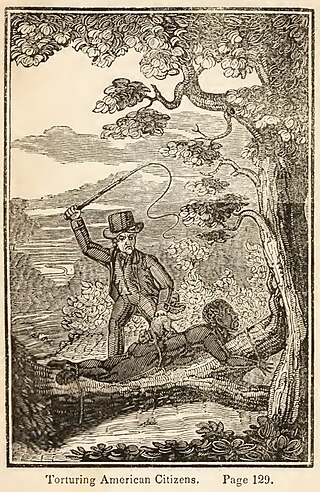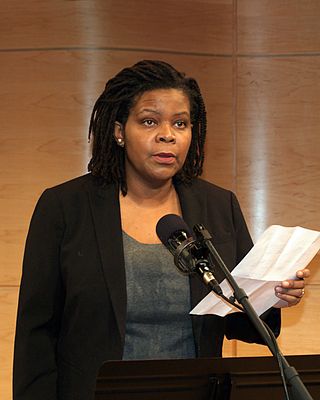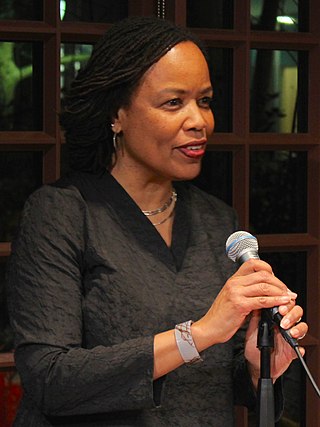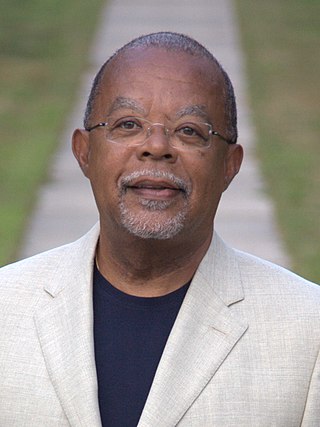Related Research Articles

The legal institution of human chattel slavery, comprising the enslavement primarily of Africans and African Americans, was prevalent in the United States of America from its founding in 1776 until 1865, predominantly in the South. Slavery was established throughout European colonization in the Americas. From 1526, during the early colonial period, it was practiced in what became Britain's colonies, including the Thirteen Colonies that formed the United States. Under the law, an enslaved person was treated as property that could be bought, sold, or given away. Slavery lasted in about half of U.S. states until abolition in 1865, and issues concerning slavery seeped into every aspect of national politics, economics, and social custom. In the decades after the end of Reconstruction in 1877, many of slavery's economic and social functions were continued through segregation, sharecropping, and convict leasing.

Slavery in Canada includes historical practices of enslavement practised by both the First Nations until the latter half of the 19th century, and by colonists during the period of European colonization.

Stanley Louis Cavell was an American philosopher. He was the Walter M. Cabot Professor of Aesthetics and the General Theory of Value at Harvard University. He worked in the fields of ethics, aesthetics, and ordinary language philosophy. As an interpreter, he produced influential works on Wittgenstein, Austin, Emerson, Thoreau, and Heidegger. His work is characterized by its conversational tone and frequent literary references.
Arnaldo Dante Momigliano, KBE, FBA was an Italian historian of classical antiquity, known for his work in historiography, and characterised by Donald Kagan as "the world's leading student of the writing of history in the ancient world". He was a MacArthur Fellow in 1987.

Ronald Toshiyuki Takaki was an American academic, historian, ethnographer and author. Born in pre-statehood Hawaii, Takaki studied at the College of Wooster and completed his doctorate in American history at the University of California, Berkeley.
Leon Frank Litwack was an American historian whose scholarship focused on slavery, the Reconstruction Era of the United States, and its aftermath into the 20th century. He won a National Book Award, the Pulitzer Prize for History, and the Francis Parkman Prize for his 1979 book Been In the Storm So Long: The Aftermath of Slavery. He also received a Guggenheim Fellowship.
Thomas Cleveland Holt is an American historian, who is the James Westfall Thompson Professor of American and African American History at the University of Chicago. He has produced a number of works on the people and descendants of the African Diaspora. He served as president of the American Historical Association in 1994.

Jacqueline Jones is an American social historian and winner of the Pulitzer Prize in history. She held the Walter Prescott Webb Chair in History and Ideas from 2008 to 2017, is the Ellen C. Temple Professor of Women’s History Emerita at the University of Texas at Austin, and is the past president of the American Historical Association. University of Texas at Austin. Her expertise is in American social history in addition to writing on economics, race, slavery, and class. She is a Macarthur Fellow, Bancroft Prize Winner, and Pulitzer Prize winner in 2024 after twice being a finalist.

Annette Gordon-Reed is an American historian and law professor. She is currently the Carl M. Loeb University Professor at Harvard University and a professor of history in the university's Faculty of Arts & Sciences. She is formerly the Charles Warren Professor of American Legal History at Harvard University and the Carol K. Pforzheimer Professor at the Radcliffe Institute for Advanced Study. Gordon-Reed is noted for changing scholarship on Thomas Jefferson regarding his relationship with Sally Hemings and her children.

Slavery among Native Americans in the United States includes slavery by and enslavement of Native Americans roughly within what is currently the United States of America.

Saidiya Hartman is an American academic and writer focusing on African-American studies. She is currently a professor at Columbia University in their English department. Her work focuses on African-American literature, cultural history, photography and ethics, and the intersections of law and literature.

Tiya Alicia Miles is an American historian. She is Michael Garvey Professor of History at Harvard University and Radcliffe Alumnae Professor at the Radcliffe Institute for Advanced Study. She is a public historian, academic historian, and creative writer whose work explores the intersections of African American, Native American and women's histories. Her research includes African American and Native American interrelated and comparative histories ; Black, Native, and U.S. women's histories; and African American and Native American women's literature. She was a 2011 MacArthur Fellow.
Lawrence William Levine was an American historian. He was born in Manhattan and died in Berkeley, California. He was noted for promoting multiculturalism and the perspectives of ordinary people in the study of history.

Slavery in Ethiopia existed for centuries, going as far back as 1495 BC and ending in 1942. There are also sources indicating the export of slaves from the Aksumite Empire. The practice formed an integral part of Ethiopian society. Slaves were traditionally drawn from the Nilotic groups inhabiting Ethiopia's southern hinterland and Oromos. War captives were another source of slaves, though the perception, treatment and duties of these prisoners was markedly different. Religious law banned Christian slave masters from taking christians as slaves, slaves were from Muslim and other non-Christian groups.

Henry Louis Gates Jr. is an American literary critic, professor, historian, and filmmaker who serves as the Alphonse Fletcher University Professor and the director of the Hutchins Center for African and African American Research at Harvard University. He is a trustee of the Gilder Lehrman Institute of American History. He rediscovered the earliest known African-American novels and has published extensively on the recognition of African-American literature as part of the Western canon.

On October 8, 1852, Maria Perkins, an enslaved woman in Charlottesville, Virginia, United States, addressed a letter to her husband, also enslaved. In the letter, she shared the news that their son Albert had been sold to a trader, expressed fears that she too might be sold, and expressed her desire for her family to be reunited. Perkins was literate, something uncommon among slaves, and all that is known about her comes from this letter.
Stephanie E. Jones-Rogers is an American historian. She is an associate professor of history at the University of California, Berkeley, and the author of They Were Her Property: White Women as Slave Owners in the American South. She is an expert in African-American history, the history of American slavery, and women's and gender history.
Allen Isaacman is an American historian specializing in the social history of Southern Africa. He is a Regents Professor of History at the University of Minnesota. In 2015, he was inducted into the American Academy of Arts and Sciences.
References
- ↑ Meet the Fellows / Class of 2012 MacArthur Fellow, Dylan C. Penningroth
- ↑ Tennison, Crissonna (2024-05-30). "LSA Announces 2024 Annual Award Winners". Law and Society Association. Retrieved 2024-10-09.